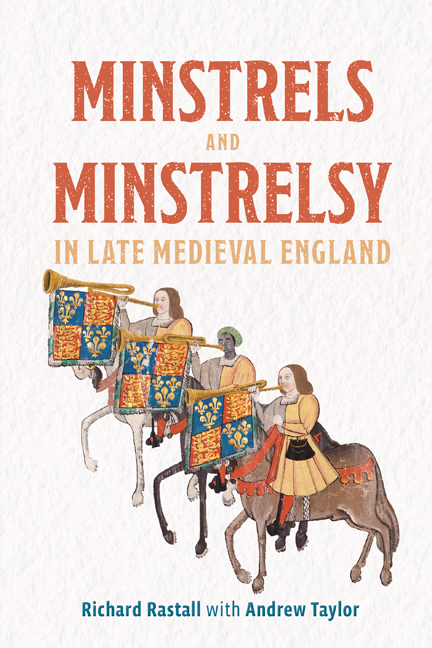Book contents
- Frontmatter
- Dedication
- Contents
- List of illustrations
- List of music examples
- List of abbreviations
- A note on references
- A note on money
- A note on dates
- Preface
- Acknowledgments
- Part I Minstrels and Minstrelsy in the Elite Households
- Part II Urban Minstrelsy
- Part III On the Road
- Part IV Minstrel Performance
- Envoi
- Bibliography
- Index
5 - Minstrelsy in noble and ecclesiastical households
Published online by Cambridge University Press: 09 January 2024
- Frontmatter
- Dedication
- Contents
- List of illustrations
- List of music examples
- List of abbreviations
- A note on references
- A note on money
- A note on dates
- Preface
- Acknowledgments
- Part I Minstrels and Minstrelsy in the Elite Households
- Part II Urban Minstrelsy
- Part III On the Road
- Part IV Minstrel Performance
- Envoi
- Bibliography
- Index
Summary
The domestic context
Any householder is the head of a household, whatever its size. A small household may have little or no structure, but it will have financial or bartering transactions, and the building must be maintained. If a household employs servants there are wages to be paid, and at a certain size of the household some records are needed. Records may be secretarial or financial, and they depend on someone in the household (or someone brought in from outside) being literate and numerate.
The households that concern us here are all of a considerable size. The king's household usually comprised around four hundred people, and some noble households approached the king's in size. In 4 Ed III the king gave liveries to a total of 669 persons, who would include members of dependent households and some servants who were not permanent members of any household. Many noble households supported minstrels – this livery-list named nineteen, as well as a waferer and three vigiles – and these roughly divide into three categories. First, the minstrels regularly employed by the head of the household, taking wages and annual fees, and normally being granted a livery in exchange for their allegiance to the principal; and some local minstrels employed, perhaps regularly, on an ad hoc basis. Second, the minstrels of important visitors, treated as honoured members of the visiting household: they normally performed during their visit, and would be rewarded accordingly. Third, some independent minstrels, or liveried minstrels not travelling with their patron or employer, would seek hospitality. These might be sent away without performing, perhaps receiving a small sum in compensation; or they might be allowed to perform, in which case they would be rewarded with money and a meal. All three categories of minstrel appear in the household accounts, although one cannot always identify the category to which a particular minstrel belonged.
We have so far discussed only royal households, but both the secular and the ecclesiastical nobility maintained households that included minstrels. Some bishops and abbots kept at least one still minstrel as a personal household servant, and many gave rewards to visiting minstrels.
- Type
- Chapter
- Information
- Minstrels and Minstrelsy in Late Medieval England , pp. 99 - 126Publisher: Boydell & BrewerPrint publication year: 2023



